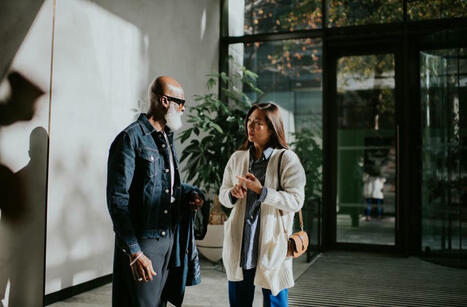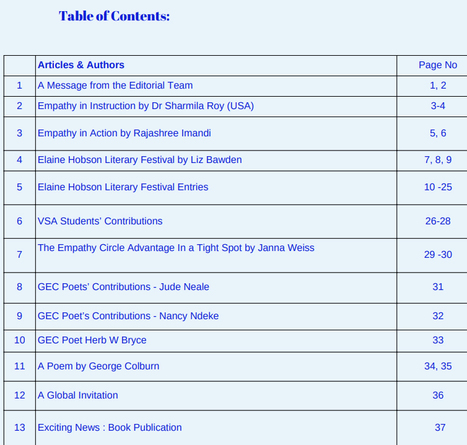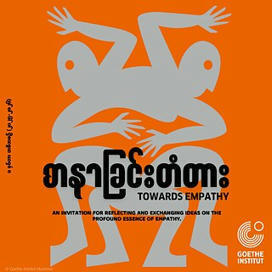 Your new post is loading...
 Your new post is loading...

|
Scooped by
Edwin Rutsch
August 18, 5:25 PM
|
By Peter Ross Empathy is often misunderstood in business. It's too easily dismissed as a “soft skill” or confused with sympathy. But I've found that for those of us responsible for both clients’ well-being and employees’ livelihoods—especially in service-driven sectors like healthcare—empathy is a hard skill with measurable impact. I’ve led my company through workforce shortages, shifting demographics and intense competition. Through it all, one thing has been clear: Organizations that center empathy—not as a buzzword but as a daily operational mindset—often outperform those that don’t. And not only in retention or morale but also in margins, outcomes and long-term growth.

|
Scooped by
Edwin Rutsch
August 17, 5:56 PM
|
The Borders of Empathy in Children’s Fiction examines how children’s books engage readers in acts of feeling-with and feeling-for others, while also questioning the limits and politics of empathy. Through close readings of contemporary international children’s literature, the book explores how narratives, characters, and visual strategies invite readers to cross cultural, emotional, and ethical boundaries. Rather than celebrating empathy as an unproblematic moral force, the book critically analyses how children’s fiction negotiates difference, vulnerability, and relationality, often revealing tensions between inclusion and exclusion.

|
Scooped by
Edwin Rutsch
August 17, 4:17 PM
|
What we are cultivating in this work is more than a set of interpersonal skills, it is the foundation for a profound shift in how human beings relate to themselves, to one another, and to the systems they inhabit.
Self-empathy is the practice of building a warm, compassionate relationship with one’s own experience. It offers relief from the inner wars of criticism, self-doubt, and emotional reactivity. Through this practice, clients learn to greet each part of their inner landscape with acceptance, opening access to wiser discernment and more effective action. At its core, self-empathy is about taking responsibility for one’s experience - not as self-blame, but as the capacity to truly meet it.

|
Scooped by
Edwin Rutsch
August 16, 7:07 PM
|
Lately, empathy has gone from being a desirable trait to a politicized concept. We discuss what empathy means and the role it plays in interpersonal relationships—as well as in today's society. Can someone gain or lose the ability to be empathetic? Is feeling empathy a matter of choice?
Panelist:
Daryl Cameron, associate professor of psychology and director of the Consortium on Moral Decision-Making, Penn State University
VIP Caller:
Julie Quimby, licensed psychologist; founder/CEO, Psychology Specialists of Maine
Nirav Shah, former principal deputy director, federal Centers for Disease Control and Prevention; former director Maine CDC; visiting professor, Colby College
Steven Dyer, instructor of criminology & criminal justice, campus chaplain, Thomas College
Cavenaugh Kelly, assistant professor, College of Health, Husson University

|
Scooped by
Edwin Rutsch
August 16, 2:59 PM
|
by Susan Krauss Whitbourne
People high in psychopathy are assumed to lack empathy, especially when seen in forensic settings.
A new study examines the empirical evidence linking a wide range of empathy measures to psychopathy ratings.
It can be helpful to understand the limitations of our current knowledge about empathy in psychopaths.
When you think of a person who fits the definition of psychopath, you undoubtedly imagine someone who, in addition to lacking remorse, is incapable of ordinary human empathy. This assumption is so baked into the psychology literature, not to mention the popular imagination, that it’s rarely questioned. Yet, what does the evidence say?

|
Scooped by
Edwin Rutsch
August 16, 2:51 PM
|
For today's suggested topic lets consider Empathy Circles. I’m in the process of trying to involve community groups in hosting Empathy Circles. Beyond the fold I would like to share my outreach letter.
Anyone in the Bay Area that is interested in helping me please send me a Daily Kos message.
To Community Group, On behalf of the Empathy Center, we invite your organization to consider using Empathy Circles as part of your community services outreach. Empathy Circles are a structured conversation between small groups of participants that are led by a facilitator. The circles by design encourage the values of mutuality, openness, and care. We have found that practicing these values in the circle setting lead to a deepening of our innate ability to empathize with ourselves, our families, and our community.
Anyone in the Bay Area that is interested in helping me please send me a Daily Kos message.

|
Scooped by
Edwin Rutsch
August 16, 2:42 PM
|
In this era of rapid transformation, the key to surviving and thriving is leaning into empathy to bring people along. Here are 3 things you can do to prepare.
3 Moves Leaders Can Make This Quarter 1. Implement Empathy Practices That Scale Start every change sprint with a “context + care” brief: what’s changing, why it matters to customers, what it means for jobs, and where people can get help.
Make manager 1:1s non-negotiable (15 minutes, weekly) with two prompts: “What’s blocking you?” and “What’s one change I can make to help this week?”

|
Scooped by
Edwin Rutsch
August 16, 2:28 PM
|
I imagine that many Americans instinctively feel revulsion when witnessing official lawlessness and brutality. They feel empathy for the suffering of struggling and disrupted families. In other words, they feel empathy.
That’s not useful to Team Trump, so they tell their followers to reject those empathetic impulses.
That’s how we get the sickening spectacle of right-wing influencers warning against “toxic empathy” and MAGA-minded preachers declaring that empathy is a “sin” — a sin!
That’s a hard sell for this Christian. I see empathy at the core of the golden rule, and of the commandment to love our neighbors as we love ourselves.
I love the reaction I’ve seen appear on church message boards and hand-drawn protest signs: “If empathy is a sin, sin boldly.”

|
Scooped by
Edwin Rutsch
August 16, 2:17 PM
|
Not everyone experiences empathy in the same way or to the same degree. For some, tuning into other people’s feelings is almost automatic or natural, like a reflex. For others, it’s more like a skill that has to be consciously practiced and sometimes, it’s possible that it doesn’t develop much at all.
Even if empathy comes naturally to you, it can fade or be withheld in certain situations, often without you realizing it. In a 2025 study published in The Journal of Social Psychology, researchers set out to understand the reasons behind this paradox.
To explore this, participants were placed in situations where they had the opportunity to connect with others emotionally. The researchers then tracked how they approached or avoided these moments.

|
Scooped by
Edwin Rutsch
August 16, 2:11 PM
|
What happens when empathy is missing? Could a single act of altruism transform generations? Empathy, once taken for granted as a virtue, is increasingly viewed through a divided lens. It is questioned, politicized, and sometimes dismissed as a weakness. Yet research, history, and personal experience suggest a different possibility: Empathy is not a mere moral luxury but a vital force that helps hold human societies together. This is even more relevant in an age marked by violence, conflict, and artificial intelligence (AI), where human connection and emotional understanding risk being overshadowed by algorithmic interactions.
In this article, I review some research and share a personal story that reveal why empathy may be essential for personal relationships and for sustaining the web of human interconnectedness.

|
Scooped by
Edwin Rutsch
August 16, 1:49 PM
|
What Is Active Listening?
Active listening is about engagement, encompassing more than just making eye contact and passively hearing someone’s words. Instead, it involves acknowledging and understanding fully what those words mean, something we don’t always have the luxury of doing. “Given the busyness of daily life,” Kim says, “we often don’t internalize what we hear from conversations and interactions with others.”
To be a good active listener means focusing on the other person, asking them questions, and clarifying what’s unclear. “Active listening involves a little bit of give and take,” Murphy says. “It is an interviewer’s skill set, a leader’s skill set.” In the workplace, active listening techniques are key for co-workers collaborating and creating together.
Combining Empathy and Communication Skills
Empathy is closely related. “It is the ability to understand another person’s thoughts and feelings,” says Murphy, a professor of organizational behavior. “It is a critical skill for putting yourself in another person’s shoes.”
Taken together, empathy and active listening skills are complimentary to each other. “Empathic people are good listeners,” Murphy says. “In order to be an active listener, it helps to have empathy to ask the right questions at the right time.”

|
Scooped by
Edwin Rutsch
August 16, 1:41 PM
|
Empathy is consciously choosing to respond with care instead of contempt or indifference. When we help people feel safe, they’re more likely to open up — and that’s when we get the information we need to make good cases.
Culture doesn’t shift on its own
Culture doesn’t change because of memos or mission statements. It changes because people decide to do things differently.
We promote based on test scores and metrics but rarely give second thought to emotional intelligence. And I didn’t learn empathy from a training video. I learned it because I knew what it felt like to be afraid and unheard. That experience didn’t make me weak — it made me slower to judge and quicker to listen. It reminded me that trust is something we build in moments, not mandates.

|
Scooped by
Edwin Rutsch
August 15, 6:59 PM
|
Greetings from Virtual School Australia!
With immense joy and gratitude, we bring you the July edition of our Empathy in Action newsletter, reaching friends and supporters across the globe. Each contribution in this issue echoes our shared belief — that empathy is not just a feeling but a force that binds us together across cultures, borders, and lived experiences.
We extend heartfelt thanks to all our contributors. Your profound thoughts, poems, stories, and essays have woven together a rich tapestry of voices that uplift and inspire. In every piece, the common thread of empathy shines —helping us grow not only as individuals but as members of a global empathic community.
|

|
Scooped by
Edwin Rutsch
August 17, 5:57 PM
|
In a previously published study, findings demonstrated that those who used the digital tele-emphathy device to simulate PD symptoms had significantly higher empathy scale scores compared with a control group that did not.1 These results suggest that the use of such technology could have practical and clinical implications for providing effective training to health care providers in the movement disorder field. Experiences such as these, whether through a digital device or a simulation, place greater emphasis on the patient’s perspective, helping clinicians better understand the challenges of living with PD.

|
Scooped by
Edwin Rutsch
August 17, 5:54 PM
|
by Shubhangi Chowdhury
Treating empathy as optional could produce superintelligent systems with no loyalty to humanity. Just as children learn empathy through seeing and hearing others, like watching a parent comfort a sibling or hearing the tone of reassurance in a friend’s voice. AI could be taught compassion through multimodal learning. By perceiving the full spectrum of human expression and pairing that with embedded values of care, AI could grow into an agent that safeguards humanity rather than replaces it. It can augment our experience.

|
Scooped by
Edwin Rutsch
August 17, 4:04 PM
|
The confusion between empathy, sympathy, and compassion is costing us real connection.
Most of us are using the wrong emotional tool without even realizing it.
Science shows empathy isn’t just one thing—it splits into two very different powers.'
The secret to influence and connection isn’t more kindness, it’s precision.
If Joseph—a war hero, top-tier business leader, and lifelong problem-solver—could confuse empathy with sympathy or compassion, it’s no wonder the rest of us do too. But when we blur these lines, we risk using the wrong emotional tool for the moment in front of us. We might offer sympathy when empathy is needed, or act from compassion when understanding alone would have been more effective.

|
Scooped by
Edwin Rutsch
August 16, 3:14 PM
|
Why Empathy Is Important in a Relationship
Healthy relationships don’t appear out of thin air (as much as we wish they did). Ultimately, they require dedication, effort, and lots of understanding. Every relationship will have disagreements, problems, and hardships—it’s natural. It’s also totally natural to have those “is this a rough patch or the right person” moments, too. But ultimately, empathy creates that safe and supportive space that gets a couple through those moments.
You’re no longer just coexisting; you’re showing up for each other in a way that actually means something. And instead of putting up walls and getting defensive, both you and your partner can feel understood, seen, and valued.
At the end of the day, it’s how you get through conflict that keeps the relationship afloat (or drowns it). You’re not avoiding conflict (because that’s also unhealthy)—you’re creating a relationship where it’s you two versus the problem, not the other way around.

|
Scooped by
Edwin Rutsch
August 16, 2:52 PM
|
Opening Statement: Launch of Towards Empathy
After a long period of careful preparation and a defining series of conversations, the Goethe-Institut Myanmar is pleased to announce the launch of its year-long initiative, Towards Empathy, starting this August.
Inspired by the notion of a collapsed architecture of empathy—a poetic metaphor for the fragility of human connection—this project seeks to listen, to feel, and to rebuild, recover, and excavate in times when hardships and constraints push empathy toward oblivion: when we believe in it, yet struggle to embody it fully

|
Scooped by
Edwin Rutsch
August 16, 2:46 PM
|
Zety’s Empathetic Jobs Report identified 14 well-paying jobs safe from AI automation that blend purpose, emotional intelligence, and long-term job security.
Why Empathy Is the New Job Security
While AI in the workplace continues to reshape white-collar and technical roles, careers grounded in emotional connection, caregiving, and interpersonal sensitivity remain firmly human. Many of the top-rated jobs that can’t be replaced by AI fall within healthcare, mental health, and education, where human presence is essential and tech can only augment—not replace—the work.

|
Scooped by
Edwin Rutsch
August 16, 2:38 PM
|
The Case for Empathy in Collections
Empathy is no longer optional, it’s expected. In fact, 73% of consumers are more loyal to brands that show empathy during debt collection. That loyalty translates into better conversations, higher recovery rates, and stronger relationships.
As Tim Casey, CEO of Alliance One, puts it:
“To start being empathetic, you have to understand your customer better and ensure that information is easy to understand and accessible to the collection specialist making that outreach.”
Empathy helps agents move beyond scripts and into meaningful dialogue. It’s about listening, not lecturing. Supporting, not pressure.

|
Scooped by
Edwin Rutsch
August 16, 2:24 PM
|
Unlock the power of empathy in customer experience. Learn how to build stronger relationships and achieve measurable outcomes with SQM Group's expert guidance.
Empathy has long been considered a soft skill—a nice-to-have rather than a business imperative. But in today’s customer experience (CX) landscape, empathy is emerging as a powerful, result-driven strategy. Contact centers that prioritize empathy not only improve their service quality but also drive measurable business outcomes, from increased customer loyalty to improved First Call Resolution (FCR) and reduced churn.
Customers today are not simply seeking quick solutions. They want to be understood, respected, and valued. Emotional connection is the new currency of customer loyalty. Brands that respond to this shift by building empathetic customer service strategies set themselves apart in an increasingly digital and impersonal world.

|
Scooped by
Edwin Rutsch
August 16, 2:15 PM
|
Before we explore why empathy works better, let’s clarify the terms. Sympathy and empathy are often mentioned together, but they are not the same. Sympathy usually means feeling sorry for someone’s situation – it’s a bit like standing at the edge of a dark hole where your friend is stuck and calling down, “That looks really rough. I’m sorry you’re down there.” You care that they’re hurt, but you maintain a distance. In contrast, empathy is feeling with the person, as if you climb down into that hole with them, look them in the eye and say, “I’m here with you. I understand something of what you feel.” Empathy is about genuinely understanding and sharing another person’s feelings, fostering a much deeper sense of connection and support. Sympathy, while it comes from kindness, often involves pity – for example, feeling bad for someone – without truly understanding the person’s experience.

|
Scooped by
Edwin Rutsch
August 16, 1:50 PM
|
When it came to responding live to users' empathetic responses, Noora had freer rein. Taking advantage of the LLM’s abilities for in-context learning, the team simulated users' personalities and had Noora practice responding to users that showed varying levels of empathy. They also selected difficult cases and provided feedback for Noora to learn from.

|
Scooped by
Edwin Rutsch
August 16, 1:42 PM
|
Earlier this summer, Second Presbyterian Church set out to help children grow in empathy. In addition to exploring what the Bible says about God’s heart for immigrants, they invited guest speakers and created activities to help kids imagine life in someone else’s shoes. The results were remarkable—one boy even gave up his dream trip to Disney World to help others.
Empathy speaks fluently in every age
In her book Reclaiming Conversation in a Digital Age, Sherry Turkle writes:
“We face a crisis of empathy. Our devices and online lives have left us less able to talk to one another, listen, and understand. Face-to-face conversation is the most human—and humanizing—thing we do.”
This week of vacation bible school (VBS) proved her point: meaningful experiences can bring empathy to life in a way no screen ever could. Helping us to grow in empathy.

|
Scooped by
Edwin Rutsch
August 16, 10:41 AM
|
Voss’s work is rooted in what he calls “tactical empathy,” which is all about understanding your counterpart — not necessarily agreeing with them. To help unlock that understanding, he recommends a variety of techniques like conversational mirroring, strategic self-criticism and a mindful change of vocal tone to defuse tension. Your approach is rooted in “tactical empathy.” Can you explain what that is and why it’s effective in negotiation? The real roots are in Carl Rogers, an American psychologist from the ’50s, ’60s, ’70s. He wrote that when someone feels thoroughly understood, you release potent forces for change within them. Not agreed with, but understood. When you feel thoroughly heard, you’re less adversarial. And the demonstration of understanding, the articulation of the other side’s point of view — purely that, no agreement at all — that’s the application of empathy.
|



 Your new post is loading...
Your new post is loading...






























